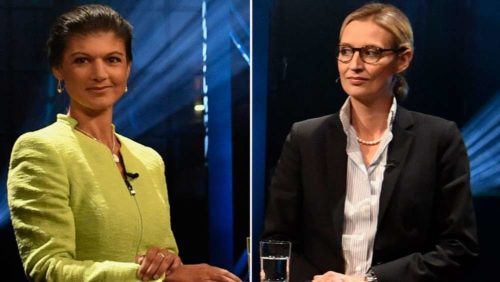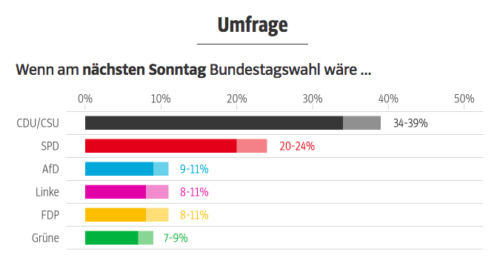Moskau, Moskau
The Ostpolitik of AfD and Die Linke

Sahra Wagenknecht (Die Linke) & Alice Weidel (AfD) Photo: Merkur.de
What is there to say about the German elections that has not been said already? Media pundits from all around the world have been persistently feeding us with articles, opinions and information on the parliamentary elections in the most powerful European state. This festival of democracy is scheduled to take place on Sunday, opening the exciting political autumn in Germany, Europe and beyond.
Only half a year ago, what seemed to be an SPD revival under the new leader Martin Schulz, now seems to have completely faded away. Everyone is more than sure that Angela Merkel will stay in power, yet at the same time speculating whether there will be another grand coalition, a conservative-liberal one, or even a so-called “Jamaica” coalition that would include the liberals and greens.
However, my focus today will be on a party that was undergoing a crisis half a year ago, but could now end up 3rd, and in the case of a grand coalition, it could be the main opposition party. Easy to guess, it is the Alternative for Germany (AfD). The contender for the bronze in this German election marathon, though slightly trailing behind, is the leftist (as the name says) Die Linke. Opinion poll trends also give a proper chance to the pro-business liberals of FDP, who are aiming to return to Bundestag after a four-year hiatus.

Opinion poll average by Süddeutsche Zeitung
I often joke in my native language by commenting for some politically-extreme individuals that they are so far-right that they end up turning left. This play of words could be described in the case of AfD and Die Linke. Their staunch anti-establishment position is well-known to an average German, but their controversial views on issues like Crimea or lifting the sanctions on Russia remain to be stressed.
While for AfD a lot has been said during this campaign, and certainly the media are fascinated with them, Die Linke has somehow been outside the spotlight, though profiting from Schulz’s magic disappearance. However, back to similarities. So what is there in common for the right-wing AfD, which started as an anti-Euro movement but turned out into something else, and the left-wing Die Linke, a post-GDR communist successor party? It is their more or less visible policy alignment with Kremlin.
Although Die Linke MP and foreign policy enthusiast Stefan Liebich explicitly states that Putin is not their friend, reality defies him. The main charisma behind Die Linke, Sahra Wagenknecht has more than once called for a security union with Russia, strongly criticising what she sees as German militarization and calling for the dissolution of NATO. Unlike the majority of left-wing individuals in Europe, Wagenknecht was also severely critical of Angela Merkel’s migration policy. Wagenknecht also blamed Merkel for the cuts in the police force that led to terrorist attacks in Germany last year.
Speaking of Merkel, German weekly Der Spiegel this week came out with an interesting title by one of its columnists, accusing Merkel of being the mother of AfD, due to her policies. The fixation that AfD has against Merkel is pretty obvious, as their main campaign agenda basically stands against everything that Merkel is for. Another common enemy for these two parties is the US (NATO). Needless to say, this is to the applaud of Kremlin. In June 2016 the European Council on Foreign Relations published an excellent survey on “insurgent” parties in Europe, and emphasized how the narrative and policies of AfD and Die Linke are often complementary to Kremlin interests. Although Kremlin did not create these parties, it definitely welcomes them. Probably more than that.
This relentless combination of right-wing nationalists with archaic socialists therefore sees the Kremlin on the one side as a promotor of conservative and illiberal values, while on the other side, as an ally against NATO and the current capitalist world order. Additionally, politicians from AfD and Die Linke are frequent guests on Kremlin-controlled media, which does everything it can to promote them. The same media published a poll result a year ago, which states that every third AfD and Die Linke voter prefers Putin over Merkel. In the same poll, Putin is significantly more popular in Eastern Germany than in the West. However, it is definitely not only due to some East Germany nostalgia.
These are the parts of the country that the mainstream parties often forget about. Eastern Germany is still economically trailing behind, and it can be clearly visible. The popularity of AfD and Die Linke in these parts of the country is then much more understood. In Thuringia for instance, Die Linke has their only Federal Prime Minister. However, as these parties are looking to achieve strong gains on Sunday’s elections, it will be interesting to see how the establishment in Berlin will respond, especially in light of the potential tough coalition talks that could take some time. But first, let us wait and see how the results on Sunday will turn out. Last year’s US election taught us that we should not take opinion polls for granted.
